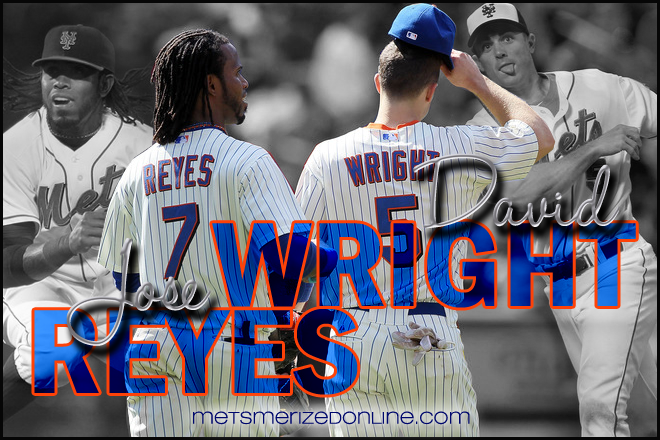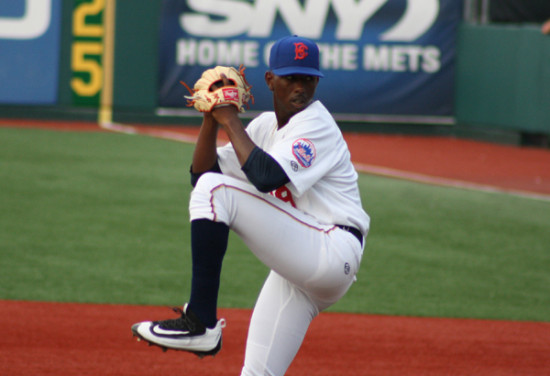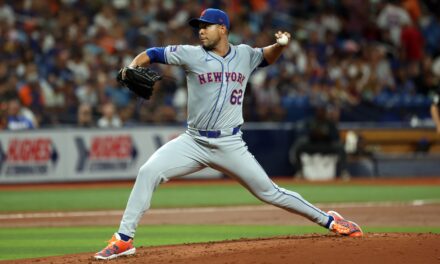
Jim Duquette has had a close relationship with the New York Mets for most of his adult life.
He began his career in Queens working as an assistant to the Minor Leagues in 1991, followed by farm director, Assistant GM/Player Personnel, and GM in 2004. After the ’04 season, the Mets brought Omar Minaya in as GM and Duquette transitioned to senior vice president of baseball operations.
After his departure from New York, Duquette was named the vice president of baseball operations with the Baltimore Orioles, sharing the GM duties with Mike Flanagan. Following his resignation from the Orioles, Duquette has worked as a baseball analyst, hosting “Power Alley” on Sirius XM’s MLB Network Radio.
He joined SNY in 2012 as the Mets studio analyst and contributor to the Mets pre and post-game coverage. He’ll be part of the studio coverage for the Mets on Opening Day, starting at 11:30 a.m.
I had the chance to speak with Duquette late last week, where we discussed his thoughts on the moves Sandy Alderson made in the offseason, the responsibilities of a GM, and some early stories of David Wright and Jose Reyes.
MMO: What did you think of the moves Sandy Alderson and the front office made this offseason? Obviously, bringing Cespedes back was a huge necessity, otherwise, they basically brought back the same team as last season. Do you think they have enough to compete in the N.L. East this season?
Jim: I was really pleasantly surprised that he was able to get basically the entire team back. It hardly ever happens that way in free agency these days. Usually, those free agents move on and you have to find some other players.
I think it was by design that they brought back Walker and Cespedes, which obviously was a good move because of the seasons they had and what their impact was. Even bringing back Salas and Blevins; I really liked those moves for the way they pitched for them at the end of the year.
I asked [Sandy] recently whether that was by design [signing Blevins and Salas] and he said it wasn’t. But because you know them it helps convince them and I think they had other options but they wanted to come back to New York. I think it was a good fit all the way around bringing those guys back, too.
MMO: From your spring observations, what are your thoughts on Matt Harvey? What does he need to do in order to get back to being a top of the rotation pitcher?
Jim: I really thought his last outing was an improvement [March 20 start, the interview was conducted prior to his March 26 start], with positives you can build on. It’s so hard to predict from this type of surgery what you’re going to get. There’s not a lot of track record yet on these guys and it’s always individual anyway. But I still have a high degree of confidence even if he were to struggle early in the season that he’s going to pitch at a high level.
I think it’s definitely unrealistic that he could get back to his All-Star status this year, but I wouldn’t rule it out at some point, the further he gets away from the surgery. It’s just one of those things where it’s hard to show patience sometimes over these things, but I think they need a degree of patience on him as he fights back from this.
MMO: What are your initial thoughts on Travis d’Arnaud? He looks to be swinging a much better bat since he deserted that swing where he basically had the bat wrapped around his head. Are you looking at this season as a make or break for him?
Jim: I definitely think it’s a make or break year for him. I think he kind of knows that, too. I think Terry [Collins] and the front office have been pretty patient with him, more than what other people would’ve felt. I think more importantly you have the same approach, but what does it mean in terms of the results? The fact that he’s gotten them so far in the spring is really encouraging.
He hasn’t thrown well yet, at least in my opinion of what I’ve seen in the games. I still think there’s more to come from him. Now that they brought Glenn Sherlock on, someone that can work with him on his throwing mechanics, I’m more upbeat that that’ll be better this year than it will be last year.
I actually feel really good, especially where he’s hitting down in the bottom of the lineup. I think he’s going to have a really good year.
MMO: What are your thoughts on Michael Conforto? What’s the best course of action in your mind for him this season? (This interview was done prior to the injury to Juan Lagares.)
Jim: I definitely wouldn’t have him coming off the bench. He didn’t get many at-bats last year in Triple-A if you look at his overall career. So if he doesn’t make the major league club, which seems unlikely as a starter right now, then I would send him down to the minor leagues. Kind of a tough pill for him to swallow, but I don’t think it would adversely hurt his long-term development.
And you know what? What’s wrong with having a little extra depth down in Triple-A? That’s a potential impact bat for you, so I don’t get too caught up in [that]. There are a lot of guys that went down to Triple-A that didn’t want to be there and then they come back up and help the major league club in a big way in the future.
As long as Bruce swings the bat well I don’t think you’re going to hear a lot of complaints, and I think Conforto is still a guy that they have big plans for. So if that was the worst-case scenario, I don’t think it would be all that bad for the Mets because it would show that they have more depth out of the position player side.

MMO: Two fan favorites, Jose Reyes and David Wright, were players you helped draft and sign when you were in the front office. Can you talk a little about what you saw in these guys, and the process that ultimately led the Mets to sign Reyes and draft Wright?
Jim: It’s funny because I remember both the stories of when we first got them. I remember our scout in the Dominican Republic, Eddy Toledo, telling me that he thought he signed a good one. He was sixteen-years-old at the time and we only had to pay him $25K or something like that. And I go, ‘Oh, that’s good Eddy. What’s his name?’ And he tells me it’s Jose Reyes.
We needed a shortstop at Kingsport, but we never brought kids from the Dominican over in their first seasons in pro ball, we always wanted them to get a year in the Dominican so we can get to know them a little bit. But our scout knew Jose a little more and he goes, “Listen, he’s a good kid. He’s got good makeup. I think he can handle it, but just protect him.” Edgardo Alfonzo’s brother, Edgar, was the manager and he’s like, “I’ll be careful, I’ll play him a couple of days a week that’s it.”
I said, ‘All right, that’s fine.’
The first night he had, I think, two hits, I don’t remember all of the details exactly. Edgar calls me and asks if he can play him tomorrow, and I said go ahead. So he gets two more hits the next night and they ended up playing him three days in a row, and Edgar goes, “You’re not going to believe this, but he’s my best player! So can I play him every day?”
Basically, we went from two-three days a week to playing him pretty much every day at Kingsport. And he never really slowed down from that point. That’s one of my favorite Reyes stories from his first pro season.
And David Wright, I give our old hitting coach at the major league level, Tom Robson, a lot of credit for him because he had been fired but was still under contract [Robson became special assistant to then-GM, Steve Phillips]. He kept coming back before the draft and saying, “There’s one guy I really, really like and that’s David Wright, a high school kid.”
We challenged him with the top, top picks. Khalil Greene was a top pick that year out of Clemson, and he [Robson] said, “Nope, I don’t like him. Nope, I don’t like this guy. David Wright’s the guy.” We waited until the sandwich pick in the first round to draft him; he turned out to be one of the best players in that draft.
I’ve always given the tip of the cap to Tom Robson because if it wasn’t his area of expertise as an amateur scout, but he knew hitting, and he identified him very early and David’s never disappointed.
MMO: With the issues Wright is and will be facing going forward, what role do you see him playing on this team?
Jim: I had a chance to talk to him when I was in camp last week. I was more optimistic about him than even last year. He was feeling more optimistic, I thought when I talked to him last week that he could come back and that his shoulder would bounce back with the right amount of time.
I think it’s just a bunch of uncertainty right around now. It’s hard to have any real expectations, but I could see at least half a season out of him.
MMO: What are your thoughts on the minor league system? Who stands out to you besides guys like Amed Rosario and Dominic Smith?
Jim: Thomas Szapucki is a kid that I really like. I haven’t seen a ton of him but his story reminds me a little bit of what we heard from Matz a couple of years ago. All the attention was on Syndergaard, Harvey and deGrom, and no one really talked about Matz. All of a sudden he comes out of Double-A and everyone’s like, wow, this guy’s going to be good!
But keep an eye on Szapucki. Scouts I’ve spoken to really, really like that impact arm.

MMO: Absolutely, Mets fans have a lot to be excited for with guys like Szapucki and Justin Dunn on the horizon.
Jim: Dunn’s another kid, that’s a good name, too. Obviously, he’s out of the Draft last year but there’s a lot of, I’m trying to remember the recent comp I heard, Marcus Stroman maybe? There are some similarities.
MMO: Can you talk a bit about how you prepare before going on air at SNY?
Jim: It’s more of a full season approach. Even though I may do a third of the games I’m watching almost all of them. If I’m not seeing every game, I’m seeing almost every game. And coming up with ideas and thoughts, a lot of times we try to do these breakdowns pregame, Nelson [Figueroa] and I both. So to be able to do that you got to pay attention to what’s going on with the team.
We like to do a lot of breakdowns on guys, whether they’re going well or not. So a lot of trying to give you not just he’s struggling, but why is he struggling, or he’s swinging the bat really well right now, what’s he doing well.
We try to dig a little bit deeper into it, and I think that’s kind of what the broadcast team does. We try to kind of emulate what they do in the pre and post, so you’re walking away learning something about the game.
MMO: What does a day-to-day schedule look like for a general manager? Can you walk me through what a normal, if there is one, routine is?
Jim: It varies by season. You have basically seven-eight months of every day dealing of issues with the team and whether it’s your own team or trying to improve the team via trade. Those are the glorified parts of the job, making trades and signing free agents, and there’s a lot of emphasis placed on that.
The majority of the work is behind the scenes really, trying to make sure you’ve done all the evaluations of players, managing your people, managing the coaching staff, the minor leagues and the scouting staff. It’s gotten bigger and bigger with the flow of information that’s out there that you have to sort through. It started my last year with the Orioles; started getting a lot of information and it’s just grown since every year.
I think the job continues to get bigger and that’s why you see these front offices getting bigger and bigger.
MMO: Are you a fan and proponent of the WBC? You were vice president of baseball operations with the Orioles the first year the WBC took place in 2006, were you worried about having your guys play?
Jim: I’ve got to tell you, Mat, the first year I didn’t like it. Mike Flanagan and I were co-GMs, and we sat there and we had a lot of guys, we had about 12 guys that left us.
Our best player was Melvin Mora, obviously a former Met, and they wanted him to play the outfield and he was playing third base for us. I told them I was concerned about it and Melvin said he was concerned so we basically told him we didn’t think it would be a good idea for him to go [play] and he didn’t go because of potential risk of injury.
But the way they build in the days off and the restrictions when it comes to pitch counts and all of that, I think they are limiting the risks a lot better. You’re still going to have that potential risk but I think that’s the biggest concern.
Having been to the event now, I was in Miami that first round [this year], I was really, really impressed and excited about how the whole thing went. The atmosphere, the competition; I’m probably more upbeat about the event now than I probably ever have been.
It’s grown, it’s continuing to grow and I like the way it is right now, working around the restrictions they have.
MMO: Absolutely, you can see the passion of the fans and the pride they share with the players on the field. It certainly seems like it is growing in popularity.
Jim: You’re right, the passion in particular that comes out in the fans but it’s also true about the players, too. They give you a lot more passion and energy on the field which is cool.
MMO: It’s a safe assumption that the Nationals and Mets will battle for the N.L. East title this season. How do you see that playing out and what will be the deciding factor in your mind?
Jim: I think this is going to be the tightest race that we’ve seen in the last three or four years. It seems like the last few years you had a good race for four or five months where one team got off to a big lead one year, with some adds and they held on. The Mets and Nationals were tight and the Mets pulled away.
I think this is going to be one of those [years] where it goes down to the very end. Not only because the Nats and the Mets are two top teams, but I think the rest of the division is tougher now. I don’t think you’re going to see teams beat up on the Braves and win 14 out of 19, or beat the Phillies 14 out of 19 like we’ve seen the last couple of years.
I still think the Mets are the best team in the division, but I think it’s going to be a tight race. The Nats don’t really have that closer position set yet, and I can see them losing a couple of close games early on. Hopefully, it’s not counterbalanced with Familia being out, we don’t know how long he’s going to be out yet.
I think these two teams are as tight and as close as I can remember in the last couple of years.
MMO: Thank you again for your time today, Jim. We’ll be watching your analysis on SNY all season.
Jim: Any time, Mathew. Good to talk with you.
You can follow Jim on Twitter, @Jim_Duquette















